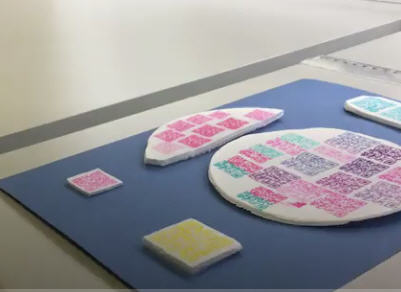New technology: Edible QR code can be the medicine of the future

Researchers at the University of Copenhagen have developed a new method for the production of medicine. They print medical drugs in QR coded patterns onto an edible material. The production can be tailored to fit each patient and has the potential to protect against wrong medication and fake medicine according to the researchers. Credit: Faculty of Health and Medical Sciences, University of Copenhagen
This production might soon be in the past. In a new study, researchers from the University of Copenhagen together with colleagues from Åbo Akademi University in Finland have developed a new method for producing medicine. They produce a white edible material. Here, they print a QR code consisting of a medical drug.
“This technology is promising, because the medical drug can be dosed exactly the way you want it to. This gives an opportunity to tailor the medication according to the patient getting it,” says Natalja Genina, Assistant Professor at Department of Pharmacy.
Potential for reducing wrong medication and fake medicine
The shape of a QR code also enables storage of data in the “pill” itself.
“Simply doing a quick scan, you can get all the information about the pharmaceutical product. In that sense it can potentially reduce cases of wrong medication and fake medicine,” says Natalja Genina.
The researchers hope that in the future a regular printer will be able to apply the medical drug in the pattern of a QR code, while the edible material will have to be produced in advance to allow on-demand production of medical drug near end-users.
“If we are successful with applying this production method to relatively simple printers, then it can enable the innovative production of personalized medicine and rethinking of the whole supply chain,” says professor Jukka Rantanen from Department of Pharmacy.
The researchers are now working to refine the methods for this medical production.
###
This research has been financed by the Independent Research Fund Denmark.
Media Contact
All latest news from the category: Medical Engineering
The development of medical equipment, products and technical procedures is characterized by high research and development costs in a variety of fields related to the study of human medicine.
innovations-report provides informative and stimulating reports and articles on topics ranging from imaging processes, cell and tissue techniques, optical techniques, implants, orthopedic aids, clinical and medical office equipment, dialysis systems and x-ray/radiation monitoring devices to endoscopy, ultrasound, surgical techniques, and dental materials.
Newest articles

Recovering phosphorus from sewage sludge ash
Chemical and heat treatment of sewage sludge can recover phosphorus in a process that could help address the problem of diminishing supplies of phosphorus ores. Valuable supplies of phosphorus could…

Efficient, sustainable and cost-effective hybrid energy storage system for modern power grids
EU project HyFlow: Over three years of research, the consortium of the EU project HyFlow has successfully developed a highly efficient, sustainable, and cost-effective hybrid energy storage system (HESS) that…

After 25 years, researchers uncover genetic cause of rare neurological disease
Some families call it a trial of faith. Others just call it a curse. The progressive neurological disease known as spinocerebellar ataxia 4 (SCA4) is a rare condition, but its…





















